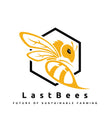Last Bees Agroecology
Agroecology is a way for sustainable farming
Between 2010 and 2020, the number of farms fell by 30%, although agricultural land remained almost the same. This indicates that land has continuously been increasingly concentrated in fewer hands, which is symptomatic of the agricultural sector's rising industrialization, which is characterized by mechanization and standardization. This sort of agriculture focuses on one or a few cash crops, transforming landscapes into ecological disaster: monocultures.
Different agricultural methods are required:
A fundamental shift in the way food is produced across the world is required. This is acknowledged by the United Nations Food and Agriculture Organization (FAO), as well as countless other agencies and experts. And this is emphasized by the present global health crisis and its consequences for our food supply networks.
Even if it is tempting, relying entirely on technology innovation to save the day is not a feasible option. We will surely gain from technological advancements, and we will need to harness the potential of new technology and digitalization for the good of people and the earth. However, the fundamental type of innovation required is social and knowledge based.
The industrial agricultural approach is unsuitable. Its ravenous consumption of scarce resources, numerous negative effects on human and environmental health, and reliance on fossil fuels and chemical inputs make it essentially unsustainable. And it can't be remedied with a few margin changes and improved technology. A fundamentally alternative paradigm for thinking about farming is urgently required. And it's possible that this is agroecology.
The fundamentals of good farming:
The term "agroecology" has a rich and complex history. In this article, we refer to agroecology as the activity of "using ecological concepts and principles to optimize relationships between plants, animals, people, and the environment," as defined by the FAO.
Agroecology is not a specific production method, but rather a strategy that depends on and maximizes natural processes to support production systems; it is a way of thinking about agronomy, ecology, and biology holistically. Producing food in harmony with nature rather than against it.
Is agroecology similar to organic farming?
Several well-known activities are agroecological in some way. Organic farming, as defined by the USDA/EU and other organic legislation, is a step in the right direction, and nature-based solutions for water, biodiversity, soils, pollutants, and livestock management, for example, are very compatible with agroecology.
Other famous systems, such as conservation agriculture (no-till agriculture) and agroforestry (the integration of trees and agriculture), are based on certain agroecological concepts but can still be maintained in mostly conventional ways.
While agroecology is not a specific system and is defined generically, there are several definite red lines that identify what is not agroecology.
Use of Synthetic pesticides cannot be recognized agroecology, however alternatives such as integrated pest management (IPM) and farm designs that maximize the presence of natural enemies may.
Reliance on external mineral fertilizer for crop development is incompatible with agroecology, but long-cycle crop rotation, soil cover, nitrogen-fixing crops, and the use of local manure and compost are all agroecological methods of assuring fertile soils.
Monocultures, or large areas planted with a single crop, are not considered agroecology. Agroecological systems rely on field and farm-level variety to protect biodiversity, soil health, and resilience, as well as to reduce nutrient contamination of air and water.
Agroecology is a viable solution to the numerous environmental challenges caused by the food we consume. We would naturally eat more healthily in an agroecological future. We would consume more plant-based meals and fewer but higher-quality meat, fish, eggs, and dairy. This would address both environmental degradation and the growing number of diet-related noncommunicable illnesses (cardiovascular disease, obesity, diabetes, and certain forms of cancer) in the USA and throughout the world.
Transitioning to agroecology in USA and throughout the world can also help to increase food security. According to research, USA can feed itself with entirely agroecological agriculture if we transition to healthier, more plant-based diets. Moving toward agroecology in developing nations could actually increase yields while also contributing to climate change adaptation. Furthermore, shifting to a food system with a lower ecological footprint can help human health by lowering pollutants and the risk of disease.
Recent European research provides both conceptual and empirical proof that agroecology is economically feasible for farmers. Possibly even more so than industrial agriculture.
Aside from increasing farm income, one research found that agroecological farms in Europe "also offer greater employment per hectare (thus supporting regional economies), use less fossil fuel, and make significant contributions towards the preservation of scenic landscapes and biodiversity," the latter of which benefits tourism.
Our existing system, influenced by market incentives and the Common Agricultural Policy (CAP), is focused on producing as much food as possible as "cheaply" as possible, with the use of chemical fertilizers and fossil fuels, while the environmental bill is increasing. Farmers are becoming older, there aren't enough young people joining the industry, and many farms are trying to make ends meet.
But our point of view is different. We view the future of farming in an agricultural sector organized around a production logic that works with nature by utilizing natural processes and cutting-edge agroecological knowledge. Farmers in this approach are not just producers of commodities, but also caretakers of nature, acting at the crossroads of food production and ecosystem protection. Their efforts are rewarded with reasonable food prices and consumer support.
"To address the difficulties in the existing system, a major shift in the way we produce, distribute, and consume food is required." Advancing agroecology is critical for this transition, as is learning from and actively supporting US and Europe's many unique examples of sustainable production systems.
Although there is no significant data supporting the model, it is quite feasible to extrapolate the data we have and envision feeding the city's residents a healthy, nutritious, and sustainable diet.
